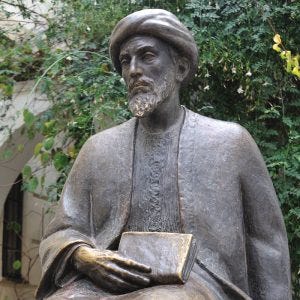The journey of repentance
Reading "On Repentance and Repair: Making Amends in an Unapologetic World" by Danya Ruttenberg, (Beacon Press, Boston) 2023 and RCL Baptism of the Lord Yr. B
After learning the truth about America’s racist past, white Christians speak of feeling paralyzed by a sense of guilt and grief. The guilt is sincere. What to do about it is unclear. Small wonder that anti-racism programs are often “one and done.”
I have been wondering about the Christian experience of feeling paralyzed by guilt. Surely, I thought, Christianity has theological resources to deal with guilt. Right?
Maybe, but the first good theological resource I have found is the 12th century Jewish scholar Maimonides and the 21st century Rabbi Danya Ruttenberg who has written about Maimonides in her book, On Repentance and Repair: Making Amends in an Unapologetic World. She studied Maimonides’ The Ways of Repentance, and explains its vitality and relevance. Her book is a pleasure to read, rich with examples and accessible even if you have never heard of Maimonides. If the concept of repentance is any part of your religious and philosophical worldview, I think you’ll really appreciate this book.
Ruttenberg explains and illustrates Maimonides’ five-step process of repentance. She also says that while repentance is a deeply personal process, it has an essential communal dimension as well. That made sense to me. The wrong which I do rarely, if ever, only harms one person. And the repentance process Ruttenberg describes cannot be done by one person alone. Because for a perpetrator, the repentance process is about personal transformation, and we can’t do personal transformation alone. We need community: guides, support, advisors, helpers.
I think some versions of Christianity miss the communal dimension of repentance and imagine that a perpetrator need only privately feel sorry for her sins, ask God for forgiveness and poof. All better. Except that that version of “repentance” never really makes anything or anyone better. Somewhere along the way, it seems that Christianity bailed on the belief that repentance must include the social and communal work of repair and personal transformation[1]. That’s too bad.
In the gospel reading for this Sunday, I hope that John the Baptist was not offering a “poof” style forgiveness-of-sins baptism. I hope he was offering people a chance to mark the beginning of their repentance journey towards personal transformation and tikkun olam -- the acts of repair and amends intended to heal and improve the world. That’s something I can imagine Jesus being drawn to.
Repentance is not a magical solution and it doesn’t erase what has been harmed or broken. As Rabbi Ruttenberg writes: “[We] can never unbreak what [we] have broken. But with the sincere and deep work of transformation, acts of repair have the potential to make something new.”[1]
In a country broken by racism, that is exactly what we need – the potential to make something new.
[1] On Repentance and Repair, 45.
Photo: Statue of Maimonides in Cordoba, Spain



Thank you so much for this clear description of what is needed to truly repent, heal and make the world a better place.
Dear Lily, thank you for this thoughtful discussion on repentance. You put into words what I believe.
Being repentant is an action. In my case, the action is usually preceded by a prayer. Each day I pray for open mindedness, kindness, and to be guided to do the right thing to be a better human. During the day when I am taking actions, I examine my motive. I look around me and learn from the kindness of others, as well.